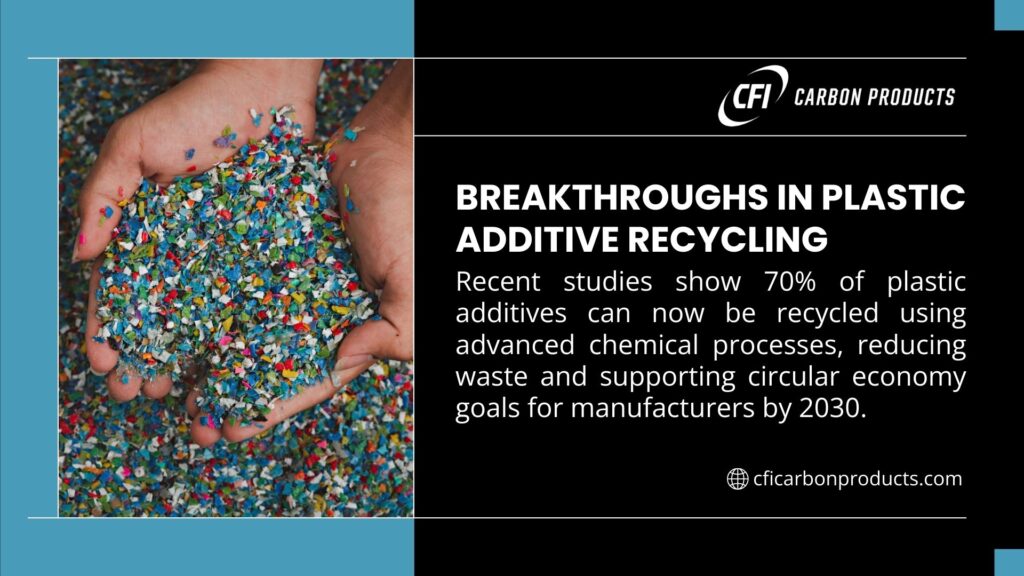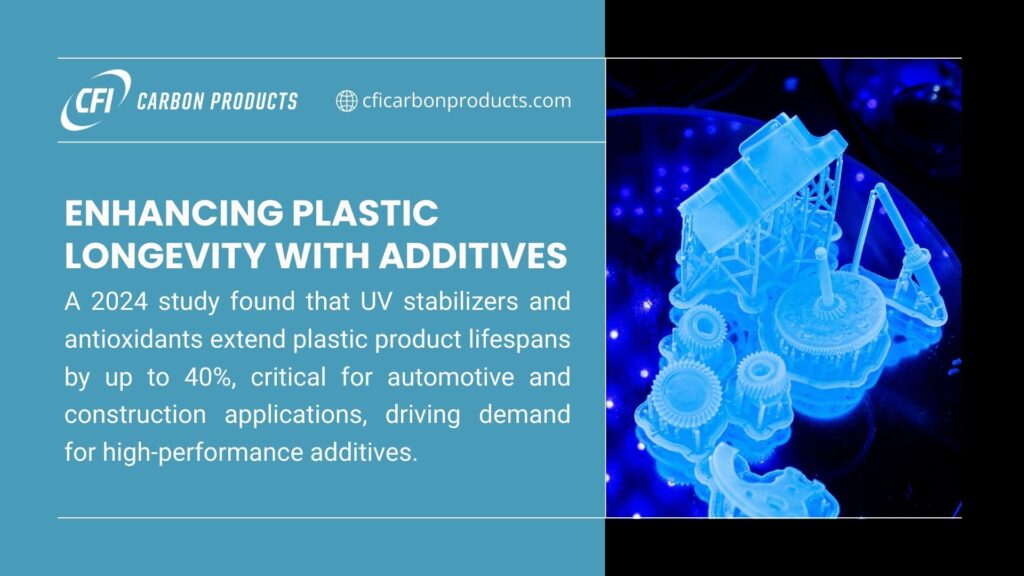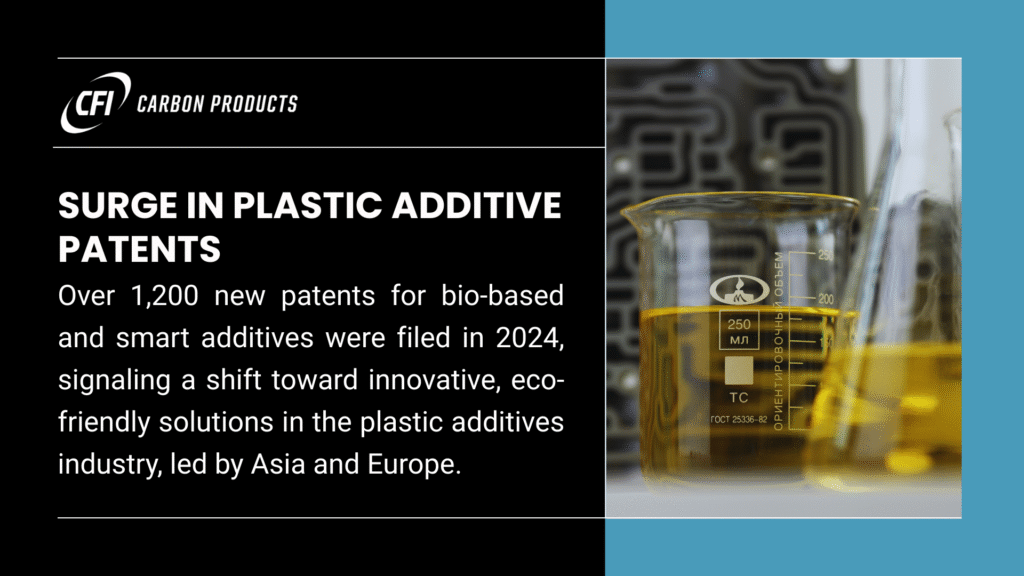Article Summary
- Leading plastic additives manufacturers are shaping the global market
- Market size reaching $89.83 billion by 2034 with a sustainable innovation focus
- Top manufacturers, including BASF, Clariant, Dow, and emerging bio-based producers
- Regional manufacturing landscapes and competitive positioning analysis
- Sustainability trends driving bio-based additive production
- Austin Black 325 as a competitive solution in the manufacturing landscape
Introduction
Finding the right plastic additives manufacturers can make or break your product development and cost structure. The global market hit $51.85 billion in 2024 and manufacturers are scrambling to secure reliable suppliers who can deliver both performance and sustainability. Smart procurement teams have learned that the cheapest option often costs more in the long run through quality issues and supply disruptions.
The landscape of plastic additives manufacturers has changed dramatically over the past few years. Traditional chemical giants now compete with innovative bio-based producers, while regional manufacturers expand globally to capture market share. Companies that once focused solely on cost are now demanding sustainable solutions, regulatory compliance, and technical support that goes far beyond basic supply.
Your supplier selection directly impacts everything from product performance to regulatory approval timelines. The wrong plastic additives manufacturers can leave you with inconsistent quality, limited technical support, and supply chain vulnerabilities that cost far more than any initial savings.
Global Market Landscape for Plastic Additives Manufacturers
The plastic additives manufacturing industry represents one of the most dynamic sectors in specialty chemicals. The global plastic additives market size was valued at USD 51.85 billion in 2024 and is expected to hit around USD 89.83 billion by 2034, growing at a CAGR of 5.65% from 2025 to 2034. This growth creates both opportunities and challenges for manufacturers competing in an increasingly complex marketplace.
Market dynamics show significant regional variation in manufacturing capabilities and strategic focus. The Asia Pacific plastic additives market held the largest Share of 60% of the global market in 2024, owing to enlarged manufacturing infrastructure and ongoing technological advancements. This concentration reflects both cost advantages and proximity to major end-use markets.
Market Size and Growth Projections
Current market data reveals robust growth expectations across all major regions and product categories. Understanding these projections helps identify which plastic additives manufacturers are positioned for long-term success.
| Market Segment | 2024 Value (USD Billion) | 2034 Projected Value (USD Billion) | CAGR 2025-2034 | Key Growth Drivers |
| Global Total | 51.85 | 89.83 | 5.65% | Sustainability demands, automotive growth |
| Asia Pacific | 32.87 | 58.39 | 6.50% | Manufacturing infrastructure, urbanization |
| Plasticizers Segment | – | – | 26.3% market share | Construction, automotive applications |
| Bio-based Additives | 2.92 | – | 7.9% | Environmental regulations, sustainability |
The packaging segment is projected to hold 32.9% of the application market share in 2025. This segment drives significant demand for plastic additives manufacturers who can provide specialized solutions for barrier properties, food safety, and sustainability requirements.
Leading Global Plastic Additives Manufacturers
The competitive landscape features a mix of established chemical giants, specialty manufacturers, and emerging bio-based producers. Each category brings different strengths and market positioning strategies.
Tier 1 Global Leaders
The largest plastic additives manufacturers dominate through scale, research capabilities, and global reach. These companies set industry standards and drive innovation across multiple application segments.
| Manufacturer | Global Position | Key Strengths | Primary Focus Areas | Revenue Impact |
| BASF SE | Market Leader | R&D investment, global facilities | Stabilizers, processing aids, sustainable solutions | Largest revenue share |
| Clariant AG | Masterbatches, additives,and sustainable products | Specialty chemicals expertise, innovation | Masterbatches, additives, sustainable products | Strong European presence |
| Dow Chemical | Major Player | Material science, automotive focus | Performance additives, processing solutions | Broad application coverage |
| Evonik Industries | Innovation Leader | Specialty chemicals, high-performance products | Advanced additives, sustainable solutions | Technology differentiation |
BASF SE largest plastic additives producer, which has facilities in more than 80 nations. By establishing a solid technological foundation, the company’s strong R&D skills enable it to create creative solutions and fulfill the shifting market demands in the short and long term.
Specialized and Regional Manufacturers
Mid-tier manufacturers often focus on specific application areas or regional markets, providing specialized expertise and customer service advantages.
| Manufacturer | Regional Strength | Specialization | Market Position | Competitive Advantage |
| Songwon Industrial | Asia Pacific | Polymer stabilizers | Second largest stabilizer producer | Cost effectiveness, technical service |
| Albemarle Corporation | Global | Flame retardants, specialty chemicals | Niche leadership | Application expertise |
| LANXESS AG | Europe/Global | High-performance additives | Premium positioning | Technical innovation |
| Kaneka Corporation | Asia Pacific | Specialty additives | Regional leader | Product innovation |
All the companies in the market leader segment demonstrated strong offerings and the ability to influence the market’s direction with their deep expertise. These companies include BASF, DOW, Evonik, Lanxess, Clariant, Kaneka and Avient.
Regional Manufacturing Landscapes
Geographic concentration of manufacturing capabilities influences supply chains, costs, and market access for plastic additives manufacturers worldwide.
Asia Pacific Manufacturing Hub
Asia Pacific dominates global production capacity, driven by favorable economics and proximity to major end-use industries.
| Country | Manufacturing Strengths | Key Producers | Market Advantages | Strategic Focus |
| China | Scale, cost advantage, domestic demand | Jike Chemical, international subsidiaries | Low-cost production, large market | Capacity expansion, quality improvement |
| India | Growing domestic market, cost competitive | Regional producers, MNC subsidiaries | Emerging market growth | Automotive, construction applications |
| South Korea | Technology, quality focus | Songwon Industrial, technology leaders | Innovation, premium products | High-performance applications |
| Japan | Technology leadership, quality | Growing domestic market, cost-competitive | Technical excellence, innovation | Specialty and high-value products |
Chinese plastic additive manufacturing enterprises will focus on optimizing product structure, moving towards diversified product development, improving product quality, and developing customized products based on specific customer requirements.

European Manufacturing Excellence
European plastic additives manufacturers focus on sustainability, regulatory compliance, and high-value applications.
| Region | Manufacturing Focus | Leading Companies | Market Characteristics | Regulatory Environment |
| Germany | Technology, automotive applications | BASF, Evonik, LANXESS | High-quality, technical excellence | Strict environmental standards |
| Switzerland | Specialty chemicals, innovation | Clariant, research-focused companies | Premium positioning, innovation | Advanced sustainability requirements |
| Netherlands | Logistics, European distribution | Regional operations | Market access, distribution | EU compliance leadership |
| Italy | Specialty applications, design | Regional producers | Design-focused applications | Strong environmental regulations |
North American Market Position
North American plastic additives manufacturers emphasize innovation, sustainability, and regulatory compliance for demanding applications.
| Country | Manufacturing Strengths | Major Players | Market Focus | Competitive Position |
| United States | Innovation, automotive, aerospace | Dow, ExxonMobil, specialty producers | High-performance applications | Technology leadership |
| Canada | Natural resources, specialty chemicals | Regional operations | Resource-based advantages | Sustainable production focus |
| Mexico | Cost-competitive manufacturing | MNC subsidiaries, regional producers | NAFTA advantages, automotive | Growing production capacity |
North America is expected to witness a significant rate of growth during the forecast period in the plastic additives market. North America has a significant manufacturing base for plastics, including industries such as automotive, packaging, construction, and consumer goods.
Sustainability and Bio-based Manufacturing
Environmental concerns are reshaping the competitive landscape as plastic additives manufacturers invest heavily in sustainable production methods and bio-based products.
Bio-based Additive Producers
New entrants and established manufacturers are developing renewable feedstock capabilities to meet sustainability demands.
| Manufacturer Category | Bio-based Focus | Technology Approach | Market Position | Investment Level |
| Chemical Giants | Sustainable portfolios | Biomass balance, renewable feedstock | Portfolio diversification | Major investments |
| Specialty Bio-producers | Dedicated bio-based production | Plant-based materials, biotechnology | Market disruption potential | Venture capital backed |
| Venture capital-backed | Local market focus | Agricultural waste, regional resources | Niche market capture | Government supported |
| Technology Partners | Process innovation | Fermentation, enzyme technology | Licensing and partnerships | R&D focused |
In September 2023, BASF SE made a significant announcement by introducing the industry’s inaugural biomass balance offerings for plastic additives. Among the initial offerings are certified products, including Irganox 1076 FD BMBcert and Irganox 1010 BMBcert.
Sustainable Manufacturing Initiatives
Leading plastic additives manufacturers are implementing comprehensive sustainability programs that go beyond product development to include production processes and supply chain management.
| Sustainability Focus | Implementation Strategies | Leading Companies | Market Impact | Timeline |
| Carbon Footprint Reduction | Energy efficiency, renewable energy | BASF, Clariant, Evonik | Competitive advantage | Ongoing through 2030 |
| Circular Economy | Recycling compatibility, waste reduction | Major manufacturers | New business models | 2025-2035 implementation |
| Bio-based Production | Renewable feedstock, biotechnology | Specialty and major producers | Market disruption | Rapid expansion phase |
| Regulatory Compliance | Proactive compliance, safety standards | All major manufacturers | Market access requirement | Continuous requirement |
Technology and Innovation Trends
Plastic additives manufacturers are investing heavily in new technologies to maintain competitive advantages and address evolving market demands.
Advanced Manufacturing Technologies
Production technology advances enable better quality control, cost reduction, and new product capabilities for leading manufacturers.
| Technology Area | Innovation Focus | Leading Adopters | Benefits | Implementation Status |
| Process Automation | Consistency, cost reduction | Major manufacturers | Quality improvement, cost reduction | Widespread adoption |
| Nanotechnology | Enhanced properties, reduced loading | Research leaders | Performance advantages | Commercial development |
| Biotechnology | Bio-based production, fermentation | Specialty producers | Sustainable production | Emerging commercial |
| Digital Integration | Supply chain, quality control | Global leaders | Efficiency, traceability | Rapid deployment |
Product Innovation Drivers
Innovation in plastic additives manufacturing focuses on addressing sustainability, performance, and regulatory requirements simultaneously.
| Innovation Area | Technical Focus | Market Drivers | Manufacturer Response | Timeline |
| Biodegradable Systems | Natural decomposition | Environmental regulations | New product lines | 2025-2030 |
| Recycling Compatible | Processing compatibility | Circular economy demands | Formulation adjustments | Current priority |
| Multi-functional Products | Single additive, multiple benefits | Cost pressure, performance | System approaches | Ongoing development |
| Smart Additives | Responsive properties | Value-added applications | Research investments | Long-term development |
Biodegradable Additives: Technologies that allow plastics to decompose naturally are gaining popularity, helping to reduce environmental impact. Nanotechnology: The incorporation of nanomaterials into additives enhances the mechanical, thermal, and barrier properties of plastics.
Austin Black 325 in the Manufacturing Landscape
Austin Black 325 from CFI Carbon Products represents a compelling alternative for manufacturers seeking reliable, sustainable additive solutions that compete effectively with products from major plastic additives manufacturers.
Competitive Positioning Analysis
Austin Black 325 offers unique advantages that address common pain points experienced with traditional suppliers and products from large plastic additives manufacturers.
| Competitive Factor | Austin Black 325 Advantage | Traditional Manufacturer Challenge | Market Opportunity |
| Sustainability Profile | Low-emission production process | High carbon footprint concerns | Growing sustainability mandates |
| Supply Chain Reliability | Focused production, U.S. based | Global supply chain vulnerabilities | Supply security demands |
| Technical Support | Personalized service, application expertise | Limited attention, bureaucratic processes | Need for technical partnership |
| Cost Effectiveness | Competitive pricing, performance value | Premium pricing for standard products | Cost pressure in competitive markets |
The environmental advantages of the Austin Black 325 position it well against products from major plastic additives manufacturers who are still transitioning to sustainable production methods.
Market Differentiation Strategy
CFI Carbon Products differentiates Austin Black 325 through focused expertise and customer service that larger plastic additives manufacturers often cannot match.
| Differentiation Area | CFI Approach | Large Manufacturer Limitations | Customer Benefit |
| Application Support | Direct access to technical experts | Layered support structure | Faster problem resolution |
| Product Customization | Flexible approach, customer focus | Standardized product lines | Tailored solutions |
| Supply Consistency | Dedicated production capacity | Multiple product priorities | Reliable supply |
| Sustainability | Transparent, documented low emissions | Complex corporate sustainability reporting | Clear environmental benefits |
This focused approach allows CFI to compete effectively against much larger plastic additives manufacturers by delivering superior customer experience and product value.
Manufacturing Quality and Compliance Standards
Quality management and regulatory compliance separate leading plastic additives manufacturers from commodity suppliers in increasingly demanding markets.
Quality Management Systems
Top-tier manufacturers implement comprehensive quality systems that ensure consistent product performance and customer satisfaction.
| Quality Focus Area | Industry Standards | Leading Practices | Manufacturer Requirements | Customer Benefits |
| Production Consistency | ISO 9001, statistical process control | Real-time monitoring, automated controls | Certified quality systems | Predictable product performance |
| Product Testing | ASTM, ISO test methods | Comprehensive testing protocols | Accredited laboratories | Performance validation |
| Supply Chain Quality | Supplier qualification, auditing | Approved vendor programs | Rigorous supplier standards | Consistent raw material quality |
| Regulatory Compliance | FDA, REACH, RoHS compliance | Proactive regulatory monitoring | Comprehensive compliance programs | Market access assurance |
Regulatory Compliance Capabilities
Regulatory requirements vary significantly across regions and applications, making compliance capability a critical differentiator among plastic additives manufacturers.
| Regulatory Area | Compliance Requirements | Manufacturer Capabilities | Market Impact | Geographic Scope |
| Food Contact | FDA, EU regulations | Migration testing, documentation | Market access for packaging | Global requirement |
| Automotive | OEM specifications, safety standards | Testing protocols, certification | Supplier approval requirements | Regional variations |
| Medical Devices | USP Class VI, ISO 10993 | Biocompatibility testing | Device approval timelines | Strict global standards |
| Environmental | REACH, RoHS, state regulations | Compliance monitoring, reporting | Market access, liability | Increasingly complex |
Leading plastic additives manufacturers maintain dedicated regulatory teams and testing capabilities to ensure compliance across multiple jurisdictions and applications.

Supply Chain and Distribution Networks
Global reach and reliable distribution separate major plastic additives manufacturers from regional suppliers, particularly for multinational customers.
Distribution Network Analysis
Effective distribution capabilities enable plastic additives manufacturers to serve diverse geographic markets while maintaining service levels.
| Distribution Model | Geographic Coverage | Service Level | Cost Structure | Customer Segments |
| Direct Manufacturing | Local/regional | High-touch, technical support | Higher cost, premium service | Large customers, technical applications |
| Regional Distributors | National/regional | Moderate service, local presence | Balanced cost/service | Mid-market customers |
| Global Distributors | International | Standardized service, broad coverage | Cost efficient | Commodity applications |
| Online Platforms | Global reach | Self-service, limited support | Lowest cost | Small volume, standard products |
Companies in the market are enhancing their international footprint by expanding into emerging markets through partnerships, acquisitions, and establishing manufacturing facilities in regions where there is strong demand for their products.
Supply Chain Resilience
Recent global disruptions have highlighted the importance of supply chain resilience as a competitive differentiator among plastic additives manufacturers.
| Resilience Factor | Risk Mitigation Strategies | Leading Practices | Business Impact | Customer Value |
| Geographic Diversification | Multiple production sites | Global manufacturing footprint | Reduced supply risk | Reliable availability |
| Raw Material Security | Multiple suppliers, strategic inventory | Supplier diversification programs | Cost stability | Predictable pricing |
| Transportation Flexibility | Multiple logistics options | Multi-modal transportation | Delivery reliability | Consistent supply |
| Demand Planning | Advanced forecasting, customer collaboration | Integrated planning systems | Inventory optimization | Service level improvement |
Market Opportunities and Challenges
The competitive landscape for plastic additives manufacturers continues evolving as new applications emerge, while traditional markets face sustainability and regulatory pressures.
Growth Opportunities
Several trends create significant opportunities for plastic additives manufacturers who can adapt quickly to changing market demands.
| Opportunity Area | Market Driver | Growth Potential | Required Capabilities | Timeline |
| Electric Vehicles | Automotive electrification | High growth, premium pricing | Thermal management, electrical properties | 2025-2035 |
| Sustainable Packaging | Environmental regulations, consumer demand | Moderate growth, differentiation | Bio-based materials, recyclability | Current priority |
| Medical Devices | Aging population, healthcare innovation | Steady growth, high value | Biocompatibility, sterilization resistance | Ongoing demand |
| Electronics Miniaturization | Device performance demands | High growth, technical challenges | High-performance properties, processing | Rapid evolution |
Major growth opportunities can be tapped into by focusing on developing biodegradable and bio-based additives, as regulatory pressures encourage a shift towards sustainable practices.
Industry Challenges
Plastic additives manufacturers face significant challenges that require strategic responses and operational adaptations.
| Challenge Category | Specific Issues | Impact on Manufacturers | Required Response | Strategic Implications |
| Regulatory Pressure | Environmental regulations, safety requirements | Increased compliance costs, market restrictions | Proactive compliance, sustainable products | Product portfolio shifts |
| Raw Material Costs | Feedstock price volatility, supply disruptions | Margin pressure, pricing challenges | Supply diversification, efficiency improvements | Operational optimization |
| Sustainability Demands | Customer requirements, regulatory mandates | R&D investment needs, process changes | Innovation investment, sustainable practices | Business model evolution |
| Competition Intensification | Global competition, new entrants | Pricing pressure, market share erosion | Differentiation strategies, value creation | Competitive positioning |
Future Outlook and Strategic Implications
The plastic additives manufacturing landscape will continue evolving rapidly as sustainability, technology, and market demands reshape competitive dynamics.
Technology Evolution
Technological advancement will increasingly differentiate successful plastic additives manufacturers from those unable to adapt to changing requirements.
| Technology Trend | Development Timeline | Market Impact | Manufacturer Requirements | Competitive Implications |
| Bio-based Production | 2025-2030 commercial expansion | Market disruption potential | Investment in biotechnology | New market entrants |
| Circular Economy Solutions | 2025-2035 implementation | Fundamental market shift | Recycling technology, system thinking | Business model changes |
| Digital Integration | 2025-2028 rapid adoption | Operational efficiency gains | IT investment, data capabilities | Competitive differentiation |
| Advanced Materials | 2030+ long-term development | Premium market creation | R&D investment, partnerships | Technology leadership |
Strategic Positioning
Successful plastic additives manufacturers will need to balance multiple strategic priorities while maintaining operational excellence and customer satisfaction.
| Strategic Priority | Implementation Approach | Success Factors | Competitive Advantage | Long-term Impact |
| Sustainability Leadership | Comprehensive ESG programs | Authentic commitment, measurable results | First-mover advantage | Market positioning |
| Innovation Excellence | R&D investment, partnerships | Technical capabilities, market insights | Product differentiation | Premium pricing power |
| Operational Efficiency | Process optimization, automation | Continuous improvement culture | Cost leadership | Margin enhancement |
| Customer Partnership | Technical service, collaboration | Deep application knowledge | Customer loyalty | Market share protection |
Partner with CFI Carbon Products
CFI Carbon Products offers a compelling alternative to traditional plastic additives manufacturers through Austin Black 325, combining performance excellence with sustainability advantages and personalized customer service.
The company’s focused approach contrasts sharply with the complex structures and bureaucratic processes common among large plastic additives manufacturers. CFI’s technical team provides direct access to application expertise and problem-solving capabilities that often get lost in larger organizations.
Explore Austin Black 325 to discover how this innovative additive delivers performance that competes with products from major manufacturers while offering superior sustainability credentials and customer service.
CFI’s commitment to quality and reliability positions Austin Black 325 as a strategic alternative for companies seeking to reduce dependence on traditional plastic additives manufacturers while improving their environmental footprint. The company’s sustainability focus aligns with growing market demands for responsible sourcing.
For comprehensive support that goes beyond product supply, CFI’s services include technical consultation, application development, and ongoing support that helps customers optimize their formulations and processes.
The company serves multiple industries where plastic additive performance matters most. Whether you’re in the plastics industry, coatings applications, or other specialized markets, CFI provides reliable alternatives to traditional plastic additives manufacturers.

Key Takeaways
- The global plastic additives manufacturing market will reach $89.83 billion by 2034, driven by sustainability demands and high-performance applications
- Leading manufacturers like BASF, Clariant, and Dow dominate through scale and innovation, while specialty producers compete through focused expertise
- Asia Pacific leads global production with 60% market share, but sustainability requirements are reshaping regional advantages
- Bio-based and sustainable additives represent the fastest-growing segment, creating opportunities for innovative manufacturers
- Supply chain resilience and regulatory compliance capabilities increasingly differentiate successful manufacturers
- Austin Black 325 offers competitive performance with superior sustainability credentials and customer service compared to traditional large manufacturers
Final Thoughts
The plastic additives manufacturing industry stands at a transformation point where sustainability, innovation, and customer service matter more than traditional scale advantages. Companies that understand these shifts and adapt their strategies accordingly will capture disproportionate value in the evolving marketplace.
Success in this industry requires more than just production capacity – it demands technical expertise, application knowledge, sustainability credentials, and the ability to build genuine partnerships with customers. These requirements create opportunities for focused manufacturers who can deliver superior value propositions.For detailed information about innovative alternatives to traditional plastic additives manufacturers, visit CFI Carbon Products’ resources or contact their specialists to discuss your specific requirements. Their expertise provides a compelling alternative to the complexity and limitations often encountered with large plastic additives manufacturers.
For More:

